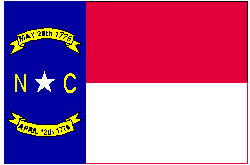
North Carolina Incentives and Laws
Last Updated October 2007
The North Carolina legislature meets annually from mid-May to July. During the session, the governor must sign or veto legislation within 10 days after transmittal or it becomes law without signature. If the legislature adjourns for more than 30 days, the governor must act within 30 days after adjournment or the legislation becomes law without signature. If the governor vetoes legislation after adjournment, the governor must reconvene the session or the legislation becomes law despite veto on the 40th day after session adjournment.
North Carolina is the home of the Triangle (www.trianglecleancities.org) and Centralina (www.4cleanfuels.com) Clean Cities Coalitions. Coordinator contact information is listed in the Points of Contact section.
View All North Carolina Summaries 
State Incentives
- Alternative Fuel Vehicle (AFV) and Hybrid Electric Vehicle (HEV) Grants
- Biofuels Industry Development
- Biodiesel Production Tax Credit
- Alternative Fuel Production Tax Credit
- Exemption for Small Biofuels Producers
- Renewable Energy Property Tax Credit
- Alternative Fuel Fueling Infrastructure Tax Credit
- Alternative Fuel Vehicle (AFV) Grants
- Alternative Fuel and Alternative Fuel Vehicle (AFV) Fund
- School Bus Emission Reduction Grants
State Laws and Regulations
- Ethanol Fueling Infrastructure Requirement
- Biodiesel Warranty Requirement
- Biodiesel Requirement for School Buses
- Alternative Fuel Use and Fuel Efficient Vehicle Requirements
- Alternative Fuel Vehicle (AFV) Acquisition Requirements
- Alternative Fuel Tax Exemption
- Biodiesel Tax Exemption
- Idle Reduction Requirement

